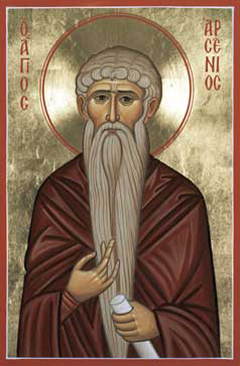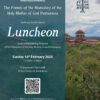
Abba Arsenios was born in Rome circa 360. He was well-educated, of senatorial rank, and served as a tutor to the sons of Emperor Theodosios I. At the age of 34, St. Arsenios sailed secretly from Rome to Alexandria and from there to Scetis where he became a monk under Abba John the Dwarf. Abba Arsenios reposed in 449.
The brethren once asked Abba Arsenios, “What is the meaning of the words which one of the elders spoke, saying, ‘He who dwells with men, because of the commotion of worldly affairs is unable to see his sins; but if he dwell in the silent repose of the desert he will be able to see God in a pure manner?'”
Abba Arsenios said, ‘The virtues which are cultivated in the world, and to which our Lord refers to in the Gospel , are, loving kindness, peace-making and other similar commandments, and it is quite possible for such virtues to be cultivated in the world by certain strenuous persons. But the purity of heart which sees God, and to which our Lord ascribed blessing, saying, ‘Blessed are the pure in heart, for they shall see God,’ cannot be acquired without dwelling in the desert and solitary and silent contemplation. The monk must acquire it in the following way.
First of all a man must go forth from the world, and dwell in a monastery, and after his training in a monastery and having gone into his cell, he must die through contemplation in silence, and through the other labours of his body, and through striving against the passions, and through conflict with devils.
Then through the tranquility of mind (which he will acquire) in silent contemplation, he will remember his sins, and when he learns to hate his passions, and has petitioned for the remission of his sins, and has suppressed his thoughts, and has become constant in pure prayer, and has cleansed his heart from abhorrent thoughts, then shall he be worthy to see in his heart, even as in a polished mirror, the light of the revelation of our Lord (shining) upon it, even as the Fathers say.
“Well, then, did that holy man say to those brethren, ‘Visit the sick, reconcile the men of wrath,’ for he who cultivates spiritual excellences in the world cannot, by reason of the commotion of the affairs thereof, see his sins; but if he continues in silent contemplation and prayer he shall see God.”
from E. A. Wallis Budge, “The Paradise of the Holy Fathers, vol. II,” (Seattle: St. Nectarios Press, 1984), pp. 319-320




